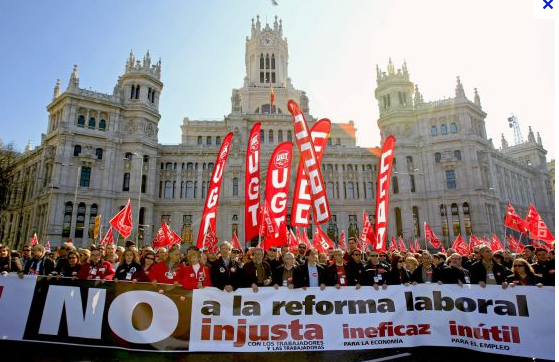Spanish labor reform may cost more jobs


MADRID -- With nearly a quarter of the population officially unemployed, the Spanish government has just made it significantly easier for companies to downsize and terminate employees. Starting this Thursday, the newest labor reform act is in effect and it favors businesses, the unemployed, and young people.
It's based around the theory that it's easier to hire someone if you know it's cheaper to fire him or her in the future. Despite the crisis, the major motivation against lay-offs has always been that it's extremely costly to the company. Originally, the compensation for unfair dismissal--which has a much broader definition than the UK or UK--was 45 days pay for each year worked, up to 42 months, or three and a half years' pay, in total severance. It has now been lowered to 33 days per year worked, or 20 days per year worked, if the employer can just show a decreased sales--not even a decrease in profits--for three quarters in a row. The Ministry of Labor said that employees are free to contest these 20-day measures in court. Now the calculation is based on the 45-day formula for the time leading up to March 1, 2012, and then the new calculations take effect before the end of this week.
The policy is written seemingly pro-business, with the idea that the businesses, once saving more expenses, will invest in technology and innovation, and the subsequent success should trickle down to the human resources departments who will then hire workers again.
Popular opinion is that the law is good, but it's the wrong time for it. Before, the enormous severance packages limited what companies could do when they needed to restructure or downsize. In order to save money, they would lay off the lower-level employees, while keeping on employees that had been with them longer, but who may not have been the best employees. It gives employers flexibility and discretion. However, most of the Spanish say this isn't the moment because the government should be focusing on creating more jobs, not making it simpler to take them away. Th bill doesn't reassure anyone that they can get a new job once fired, in the much more closed Spanish job market, where people can be unemployed easily for six to 12 months.
Half of the adults under 30 have no jobs. Solving this problem is one of the targets of this overarching law. Now, if a company has given a "beca," which is a kind of paid internship, or if they've had them on a temporary "trainee" contract for 24 months or more, they must then sign them to an indefinite contract. This is a big deal for consultancy companies, particularly in the technology, architectural and engineering sectors, where it is common practice to chain together temporary contracts.
In fact, until the unemployment rate drops below 15 percent, companies are not even allowed to give "becas" for those over 30 years of age. In addition, small businesses and start-ups that hire workers under 30 will receive a tax credit of 3,000 euros.
While benefiting the Spanish youth, the law makes it more difficult for the over-50 crowd. Before this law, companies had to pay the 45 days to workers who have been made "redundant," which most commonly means workers over 50 who do not have a certain technical training. That would mean that some companies would have to risk shutting down in order to cover the often astronomical cost, that can be in the tens of thousands of euros. Now, it's easier for companies to let this demographic go, especially as individuals, with less justification. Of course, the longer you've worked for a company, the older you probably are, giving you must less of a chance at reemployment elsewhere. While age discrimination is officially illegal in Spain, it's expected that both your age and marital status be included on your curriculum vitae when applying for jobs.
Companies that have hired someone who is perceived as being "long-term unemployed"--which means they've received the "paro" or unemployment benefits for at least three months--can receive 4,500 euros.
The labor reform also gives priority to small business entrepreneurs, something that isn't well-promoted in Spain. The government launched permanent contracts for entrepreneurs, instead of necessitating they go "autonomo" or freelance. The law gives these small businesses, especially those with 50 or fewer workers, the ability to more easily rewrite the labor contracts and to fire workers without as steep of consequences as larger companies have. Under the law, "the direction of the company may agree to substantial changes in working conditions where there is proof (to increase) economic, technical, organizational or production, such shall be considered that are related to competitiveness, productivity or technical organization." This is extremely broad reasoning allowed for termination.
The law does seem to make it easier to fire those that aren't doing their jobs, at least in the private sector, while "funcionarios" or public servants still hold their positions for life. Spain is notorious as one of the EU nations with the highest level of absenteeism. One part of the bill was dedicated to make it much easier for employers to justify the individual dismissal of people clearly being abusively absent or maybe truly have a disease that takes you out of commission for awhile like cancer. In two consecutive months, if you've been sick eight to nine days or more or, throughout the year, if you've been out at least 20 days, you can be fired.
SmartPlanet spoke with one employment recruiter who was actually sad to be working a particular banking process, where processes are rare and treasured. She said it was a confidential one because it was to replace a successful sales director who suddenly came down with a brain condition and was temporarily paralyzed. He should be fine and ready to work within the year, but how can the recruiter suggest just a temporary replacement when she is desperately trying just to meet her monthly goals.
This law also removes the Zapatero administration's bonus for companies that reintegrate women after maternity leave. This was an annual tax discount of 1,200 euros per year for four years following their reintegration. The law was to combat mommy tracking, but was not renewed, thus making it easier to end contracts of mothers, particularly if a complication arrises and they miss more than the official four-month maternity leave.
Finally, the widespread law includes a provision in which directors of publicly-traded companies can no longer be paid for holding a position on the board. This should limit Lehman Brothers-type bonuses. Specifically, managers of financial institutions that have been removed from office will not be allowed to receive any compensation or severance package.
For all terminations, the new laws take away some rights from employees and give them to employers, but the ex-employees are, of course, allowed to contest these terminations. However, now they must just do it within two months of the termination.
During the first two months of the Mariano Rajoy administration, there have been three significant laws instated. First was the SOPA-like "ley Sinde," which plans for the takedown of Megaload-type sites.The next was the fiscal reform act that aims for larger banks, like Santander and BBVA, to absorb at-risk, smaller, partially-public, bank-like entities called "cajas," to prevent them from closing down. Finally the new government passed the Labor Reform Act, which like the Sinde law, is set to take effect this Thursday.
All these laws aim to attract foreign investors. Spain should technically be already attractive since it has some of the lowest foreign debt in the EU. However, there is little consumerism, particularly from the Spanish people themselves. "If there's no consumption, there's no attraction," said Miguel, who works in the bid department of a huge Spanish construction company. This is apparent.
None of the laws specifically target the promotion of consumerism. Nor do they directly address that companies cannot innovate nor expand until there are banks with money to give them loans. No one seems to have these magic solutions, but they are certainly the most important pieces missing from the Castellano economic puzzle.
Photo: 4EverSpain.com
This post was originally published on Smartplanet.com